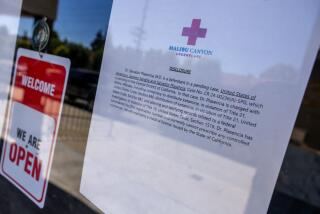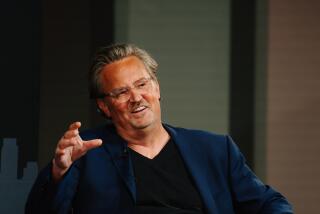Jackson’s doctor raises ‘no red flag’
Los Angeles police completed a three-hour interview Saturday night with the doctor who was with Michael Jackson when the pop star went into cardiac arrest, and a source close to the investigation said detectives found “no red flag” during the discussion.
A private pathologist, meanwhile, conducted a second autopsy on Jackson’s body hours after it was released to relatives by the Los Angeles County coroner.
Coroner’s officials had said Jackson had been using prescription drugs, and the investigation is focused on whether he overdosed. But after the LAPD completed its interview with Dr. Conrad Murray, Jackson’s personal physician, the source said there was “no red flag” and “no smoking gun” revealed in the interview to suggest criminal wrongdoing or the possible cause of death.
The source spoke to The Times on condition of anonymity because the investigation is ongoing.
Los Angeles police have said Murray is not suspected of wrongdoing and is cooperating with the investigation into the performer’s death.
The law firm that Murray has hired said in a statement that he was “considered to be a witness to the events surrounding Michael Jackson’s death.” The firm said Murray answered “every and all” questions posed by LAPD investigators and “clarified some inconsistencies.”
The coroner’s office, which completed its autopsy Friday, said there was no evidence of foul play. The coroner has listed the cause of death as “deferred” until more tests are complete.
Results could take up to six weeks.
Sources confirmed that Jackson’s family -- apparently eager for an independent opinion -- had a second autopsy performed.
Jackson, 50, was stricken Thursday at his rented chateau in Holmby Hills, above Sunset Boulevard, and died after suffering what his brother Jermaine Jackson said was cardiac arrest.
Families who obtain a second autopsy often do so because they want to confirm the cause of death.
A second autopsy can also give relatives information much faster than an autopsy conducted by law enforcement officials, said Michael Baden, a former chief medical examiner in New York City who has investigated or testified in a number of high-profile cases, including the criminal trials of O.J. Simpson and Phil Spector.
A private pathologist can rush toxicology tests through a lab to help determine what drugs were present at the time of death, he said.
“The second autopsy will give the family a lot more information than they have -- right away, within a few days,” Baden said. The procedures typically cost between $10,000 and $20,000.
There are, however, limitations. The reason an official autopsy can take longer is that government authorities use methodology that generates a chain of evidence admissible in court -- “and that takes a little bit of time,” Baden said.
In addition, the coroner probably kept Jackson’s brain even after his body was released in order to conduct a neuropathology test, said Cyril Wecht, a forensic pathologist and former coroner in Allegheny County, Pa., who conducted the second autopsy of Anna Nicole Smith’s son.
Those tests could reveal, among other things, whether Jackson’s brain had been damaged by drug abuse and whether he had suffered overdoses in the past.
“If that’s being done, the second autopsy won’t shed any light on that, because the brain will be in the medical examiner’s office,” Baden said.
Jackson’s family has begun piecing together plans for a funeral or public memorial. The LAPD is being apprised of planning in the event that it needs to prepare for a large gathering of fans.
The family also issued a statement to Jackson’s fans through People magazine Saturday night, describing themselves as heartbroken but grateful for the outpouring of support around the world.
“We miss Michael endlessly,” the statement said. “Our pain cannot be described in words. But Michael would not want us to give up now. . . . Please do not despair, because Michael will continue to live on in each and every one of you. Continue to spread his message, because that is what he would want you to do.”
Hundreds of fans continued to converge Saturday at Grauman’s Chinese Theatre on Hollywood Boulevard, lining up for a glimpse of Jackson’s star on the Walk of Fame. Virtually all took snapshots; a few placed roses, teddy bears and photographs near the star as security guards hurried them along.
Dozens more fans gathered at the Jackson family home in Encino, some posting notes and photographs on a wall outside.
In Holmby Hills, two white Atlas Van Lines moving trucks arrived at Jackson’s rented home at roughly the same time that the singer’s sister, Janet Jackson, pulled up in a maroon Bentley. Workers were soon seen removing items from the home.
Michael Jackson’s personal physician, meanwhile, met with the LAPD Saturday evening.
Murray, a cardiologist with offices in Houston and Las Vegas, had been treating Jackson since 2006, the year the performer returned to live in the United States after stays in Bahrain and Europe. Jackson set up house with his three children in Las Vegas and turned to Murray for medical care.
When Jackson came to Los Angeles last year to rehearse for a series of comeback concerts in London, Murray stayed in Las Vegas. But as the performances drew near -- the first was set for July 13 -- Jackson asked Murray to come to L.A.
Jackson told the concert promoter, L.A.-based AEG Live, that he wanted Murray at his side for the entire London run -- a seven-month stretch. Jackson asked AEG to advance Murray, who suspended his practices to take the gig, a “significant” amount of money from the show’s production budget, said AEG Live Chief Executive Randy Phillips.
Murray had not yet been paid, Phillips said.
Murray hired Houston-based attorney Edward M. Chernoff, of the law firm Stradley, Chernoff & Alford, to represent him during his meetings with the LAPD.
The firm’s website describes Chernoff as a patriarch of the firm who handles its most complicated cases.
Chernoff has also worked with the Harris County, Texas, district attorney’s office, where he lost one felony jury trial out of 40, according to his biography.
“Our assumption at this point is that he didn’t do anything wrong,” Bill Stradley, a partner in the firm, said of Murray.
In the days leading up to his death, Jackson had been rehearsing for the sold-out concerts at London’s O2 Arena.
His business empire had pitched the shows, which had been dubbed “This Is It,” as the start of a mammoth comeback, which would go on to include additional tours, a Graceland-like museum, revues in Macau and more.
Kenny Ortega, the director of the comeback concerts, said he is seeking to create a tribute to the singer using some of the choreography, costuming and musical staging Jackson had produced for the concert run.
AEG is preparing to announce its refund policy for the nearly 1 million tickets sold for the 50 canceled shows.
Company spokesman Michael Roth said it was “premature” to discuss the notion of a series of tribute concerts.
--
ron.lin@latimes.com
harriet.ryan@latimes.com
scott.gold@latimes.com
Times staff writer Chris Lee contributed to this report.
More to Read
Sign up for Essential California
The most important California stories and recommendations in your inbox every morning.
You may occasionally receive promotional content from the Los Angeles Times.













